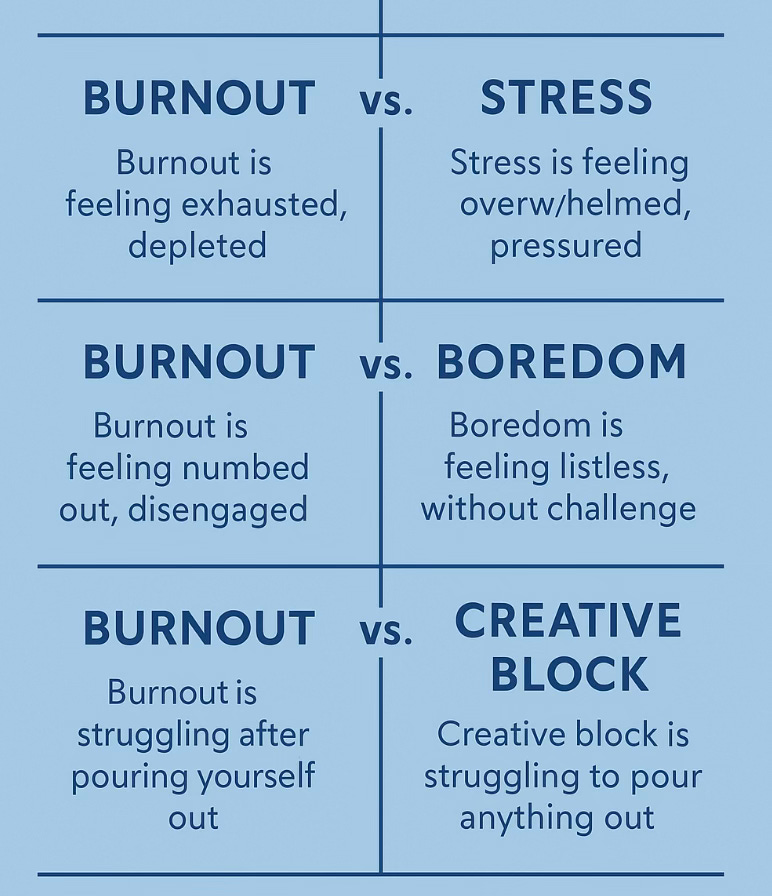Is This Creative Burnout or Something Else?
Understanding what's really happening when your creative energy disappears
You sit down to write, and nothing comes.
You stare at your art supplies, and feel nothing at all.
You scroll past inspiration, deadlines, and ideas without the smallest flicker of interest.
If you’re a creative person who has felt like this lately, you may have wondered:
Am I burned out? Or is it something else?
The answer matters. Because how you care for yourself depends on how you understand what's actually happening underneath the silence.
What We Commonly Call Burnout
Creative burnout is typically defined as emotional, cognitive, and physical exhaustion related to sustained creative output. It often includes:
Feelings of detachment from your work
Reduced ability to focus
Frustration, numbness, or emotional depletion
From a psychological standpoint, burnout has three components: exhaustion, cynicism, and inefficacy. These were originally studied in workplace settings, but the same mechanisms apply to artists, writers, and independent creatives.
When your creativity is tied to your income, your identity, or your sense of purpose, the stakes are high. That’s why creative burnout can feel so disorienting. It is not just about needing rest. It is about losing connection to something that once felt central to who you are.
But not all creative shutdown is burnout. Calling it that can lead you to solutions that do not fit.
It Might Be Something Else
Burnout is just one piece of a larger set of experiences that creatives often face. Some other possibilities include:
1. Freeze Response
The freeze state is part of the autonomic nervous system’s response to stress. When neither fight nor flight feels safe, the system may go still. You might feel immobilized, foggy, detached, or numb.
This often gets misdiagnosed as procrastination or disinterest. But what’s really happening is physiological. Your body may be protecting you from perceived overwhelm or vulnerability.
2. Fawn Response
Fawn is another nervous system response, often shaped by relational trauma or long-term invalidation. In this state, you may appear functional (still creating, still showing up), but you are doing so to avoid conflict, maintain approval, or reduce perceived threat.
In creative terms, this can look like overproducing, overcommitting, or masking your true voice in your work.
3. Depression or Grief
Not all fatigue is burnout. If your creative work feels meaningless, or if you’ve lost access to joy even in other parts of life, it might signal a deeper mental health issue. Similarly, if you’ve experienced loss (of a person, a role, a belief, or a version of yourself), your system may be grieving, even if you don’t name it that way.
4. Chronic Health and/or Neurodivergence
For some creatives, a fluctuation in energy or motivation is not burnout, but baseline. You may be living with chronic illness or neurodivergence that makes consistent output impossible. When you judge this reality by neurotypical or able-bodied standards, you call it burnout. But really, it is misalignment.
You may not need rest. You may need a reframe.
My Own Experience
As someone with a chronic mental health condition, I have experienced many seasons where I thought I was burned out. I wasn’t. I was dissociated. Or overcommitted. Or masking. Or quietly grieving a version of myself I didn’t know how to be anymore.
Once I began to understand the distinctions, I stopped trying to apply surface-level fixes to deep, systemic patterns. I stopped treating myself like a broken machine and started listening to what my creative self actually needed.
This is also the lens I bring to my 1:1 Creativity and Wellness Sessions. You do not need to perform or prove anything. You just need to be willing to look more honestly at what is happening and to allow a different kind of support.
How to Tell the Difference
Here are a few reflective questions to help clarify what you may be experiencing:
Do you feel emotionally flat, or emotionally overwhelmed?
Are you still interested in your work but too tired to begin, or do you feel disconnected from it entirely?
Are you pushing yourself to create because you want to, or because you’re afraid of what it means to stop?
Have your basic needs (rest, nourishment, regulation) been met lately?
Do you feel shame about how little you're doing, or confusion about why you care less than usual?
There are no perfect answers here. But patterns will emerge when you listen carefully.
What You Can Do Now
If you believe you are experiencing creative burnout, the most important thing is not to push harder. Instead, consider:
Resting without apology
Setting honest boundaries with your time, tools, and energy
Redefining success in your current season
Finding creative outlets that do not require an audience
Asking for support from someone who understands the complexity of creative identity
You may not need to recover productivity. You may need to rebuild trust.
That’s what I do with clients.
Book Your Session
Sessions are held over Zoom, with alternative formats available (email/text-based coaching for those who prefer it).
Don’t see a time that works for you? Send me an email and we’ll work something out.
You are not wrong for being tired.
You are not less of an artist because your work feels far away.
You are simply in a moment that deserves care.
Let’s begin there.
Not ready to book? Keep getting free tips:






